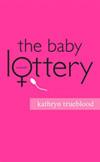The Baby Lottery

Kathryn Trueblood takes on the weighty issues of motherhood in the age of abortion in her first novel, The Baby Lottery. (Trueblood is also the author of a book of short stories, The Sperm Donor’s Daughter.) Her characters are a circle of friends who have stayed together from college into their thirties. One is preparing for an abortion and coping with an overbearing husband. One is a nurse working with abortion providers. Two have young children of their own. One, a single mother, is struggling to raise a drug-free teenager despite her and her friends’ history of (and in some cases, current) drug use. And one has lost thousands of dollars and a husband in a fruitless quest to conceive; she hopes to adopt her friend’s child before the imminent abortion.
The characters are fascinating, the situations realistic, and the supporting characters are all appropriately self-motivated and interesting. The problem? The method of storytelling.
Each chapter is written in third-person limited, with the lead character’s name as a subtitle. This scattershot of perspectives can be effective, but the author spends most of her narration talking about what each character thinks, how she feels and what she does - usually something solitary, like laundry, attempting to write a novel or washing up for a medical procedure. Easily half of the novel, and probably more, has a single character alone with her thoughts and tasks that feel like they exist simply to provide a venue for this introspection. The women think about their futures, their thoughts on abortion and motherhood, the role of feminism and their friends. The book feels full of quotes that a woman’s study program would love and indeed are beautiful and insightful, but the author tells her story through eavesdropping on thought. Nothing happens, but plenty is thought about: even a potentially dramatic trip to an abortion hospital is presented to the reader as a passing memory.
This author has a great mind for language and for stories, and I hope that she is able to combine them in her next novel to write a story that rises above this good but not great novel.